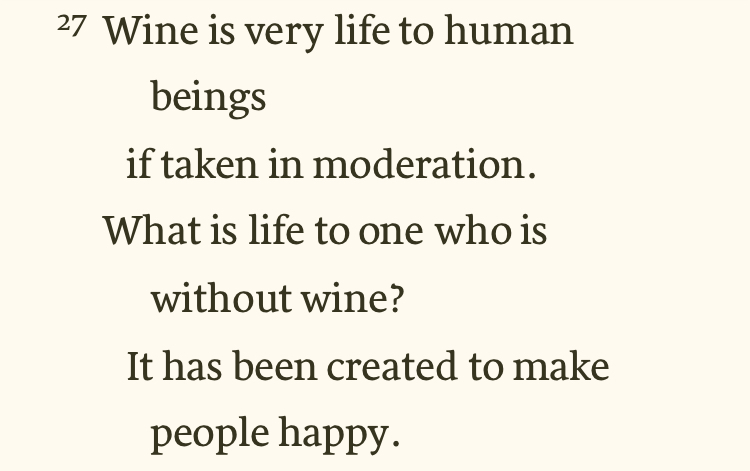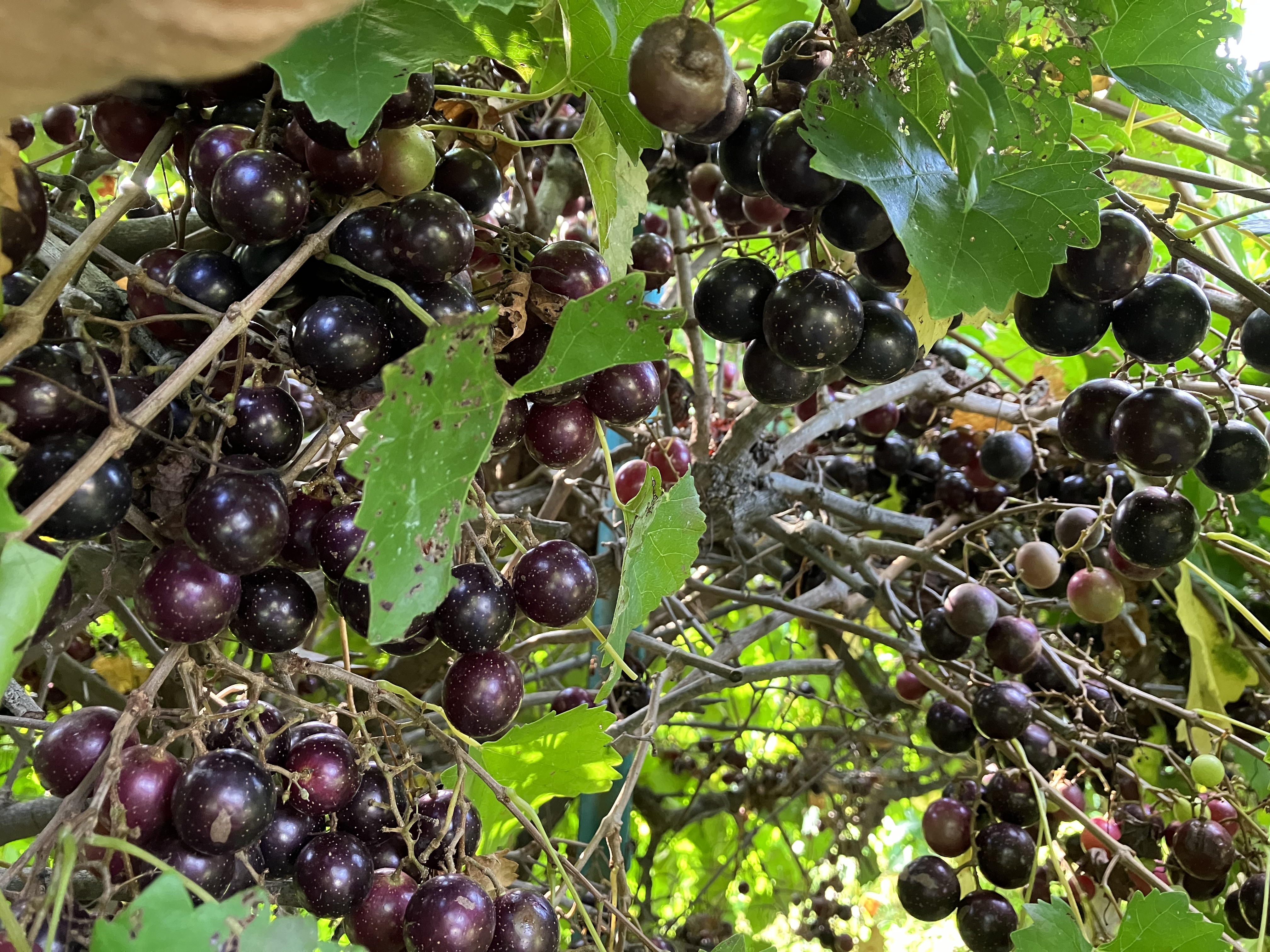I remember a youtube blogger making wine from all kinds of fruits, grain crops, even one with mackerel, and then tasting and scoring it, mostly 50 to 70, but when it came to grapes, random 75s and 80s.




noun
an alcoholic drink made from fermented grape juice.
"he opened a bottle of red wine"






![Craft A Brew - Safale S-04 Dry Yeast - Fermentis - English Ale Dry Yeast - For English and American Ales and Hard Apple Ciders - Ingredients for Home Brewing - Beer Making Supplies - [1 Pack]](https://m.media-amazon.com/images/I/41fVGNh6JfL._SL500_.jpg)







Well, I don’t know anything about that “Mother Nature” gal, but in Sirach 31, it says of our Father God:Unlike most other fruits, grapes have just about perfect amounts of sugar and water and come off the vine covered with yeast that has evolved over eons to ferment them. It's almost like mother nature decided to make a wine kit.

My late uncle made a ton of "wine" from anything from dandelions to tomatoes.There is a winery in Canada that uses tomatoes.
Some folks 'round these parts make tomato wine.My late uncle made a ton of "wine" from anything from dandelions to tomatoes.
It was all very sweet stuff that I didn't care much for, but I was not much for wine at that point either.
yikesA buddy of mine made tomato wine. It actually turned yellow and tasted like cider with a slight tomato character.
That's a linguistic argument more than an explanation of people's beverage preferences.Wine is the product of fermented grapes, no more and no less, it cannot contain any other type of fruit otherwise it can no longer be called wine.
What I wanted to say is that each thing has its name, wine is made from grapes, beer is made from malt (generally), etc... and each thing should be called by its name.Humans have been making "wine" from fruits other than grapes for about as long as they've been making wine from grapes. Or who knows, maybe even longer. The original question isn't about linguistics or legalities, it's about why grape wine is the dominant fermented fruit juice beverage.
And lots of them are called wine - rice wine, dandelion wine, etc. I wasn't talking about cider or perry or any other beverage that has always had its own name.But they had other names for those ferment fruit juices. Many of them lost today I imagine. Cider for apples is one example and perry if made from pear juice.
And as I said before, I think it's because no other fruit is as well-suited to making a fermented beverage that tastes good. The stuff practically makes itself.As for it being the most dominant fermented fruit drink, I think that's due to its wide variety.
You mean apfelwein?cider
I understand but those terms are wrong, you can call them what you want, however they will not be wine from the moment they use more of the grapes (of course, I'm not counting yeasts and other compounds already present in the grapes but which have to add to "balance" the wine).And lots of them are called wine - rice wine, dandelion wine, etc. I wasn't talking about cider or perry or any other beverage that has always had its own name.
And as I said before, I think it's because no other fruit is as well-suited to making a fermented beverage that tastes good. The stuff practically makes itself.
It's got nothing to do with what I want to call them. And it's got nothing to do with modern legal regulations of what can be called what when you're trying to sell it or export it or import it. People have been calling them wine for as long as they've been calling the stuff made from grapes wine.you can call them what you want

Any fermented fruit juice is wine. Including cider.I've seen several answers, some more correct than others, but the "true" and only answer is simple. Wine is the product of fermented grapes, no more and no less, it cannot contain any other type of fruit otherwise it can no longer be called wine.
I say this, not because I remembered but because in a way I am linked to the wine sector and this is regulated by several organizations, one of which is the OIV (international wine organization) so if you want to know more you can consult their website but answering in very succinctly to the initial question, if it were made with other fruits it would no longer be wine.
On the surface it appears as if the determination of the exclusivity of the definition was made by people with a vested interest in maintaining the exclusivity of the definition.I say this, not because I remembered but because in a way I am linked to the wine sector and this is regulated by several organizations, one of which is the OIV (international wine organization) so if you want to know more you can consult their website but answering in very succinctly to the initial question, if it were made with other fruits it would no longer be wine.
As for it being the most dominant fermented fruit drink, I think that's due to its wide variety. You can feel this variety much more than in most drinks, just within the wine you have many different styles (dry, sparkling, liqueurs, etc...) and then this still depends on the hundreds of grape varieties (which are strongly influenced by the climate ) and combinations thereof. Within that, it still depends on how they are made and the "work" they do afterwards... that is, with the exception of perhaps beer, which also has a lot of possible combinations, wine is the alcoholic beverage (I'm not counting spirits) that offers more variety, so it's easier for it to be the most dominant.
(Of course, in my opinion, there could be another reason, but in my opinion, I think it might be because of this. oh, and the cultural part also plays a very important role)
We don't "want" to use this more enlarged definition. It's not a matter of opinion. This is a matter of right and wrong. My job is in linguistics and regardless of whether you want to come from a "descriptionist" perspective (describing how language is actually used - in which case, and it might be different in other languages, but in English, wine is not limited to grapes) or a "prescriptionist" perspective (describing how dictionaries and so on say language should be used - which also says that wine is used for an alcoholic beverage made by any fruit, such as Merriam-Webster, Oxford, etc.), you are wrong. So you shouldn't change your "opinion." You should correct your incorrect definition.Okay, everyone has their own opinion. As I said previously in another message, I understand that you want to use this more enlarged definition, although for me it is wrong (and for you I am wrong) but that is because it was what I was taught in my years of study and at a professional level by credible sources, but opinions change a lot even due to geographical and cultural reasons.
In any case, and although I was the one who brought this topic here, I think it is more relevant to focus on the initial issue (because on this we can debate as much as we want and I don't think either side will change their opinion) a Since this has a lot of possible debate. Regardless of everything, I already left my answer to the initial question in a message above, if you want to return to this topic I think it would be more advantageous but if you want to stay with me that's fine, especially because I was actually the one who "introduced" it.
Hmmm… I find it a bit odd that their definition of a “non-wine” (not made from grapes) is described as “a kind of wine,” and not “similar to wine,” or “substitute for wine.” I think the folks at Britannica could have been a bit clearer in their choice of wording.wine, the fermented juice of the grape. Of the grape genus Vitis, one species, V. vinifera (often erroneously called the European grape), is used almost exclusively. Beverages produced from V. labrusca, the native American grape, and from other grape species are also considered wines. When other fruits are fermented to produce a kind of wine, the name of the fruit is included, as in the terms peach wine and blackberry wine.
But it is wine, but just a different "kind of wine." The way it works is that because grapes are the most common kind of wine, saying "wine" without a qualifier specifies that it is made from grapes, while adding a qualifier specifies that it's made from that substance.Hmmm… I find it a bit odd that their definition of a “non-wine” (not made from grapes) is described as “a kind of wine,” and not “similar to wine,” or “substitute for wine.” I think the folks at Britannica could have been a bit clearer in their choice of wording.
Indeed.And tomato is a fruit. QED!
If we get back to the original question, I would just simply suggest that grapes do it better than any other fruit. I do blackberries, blueberries, cranberry, and peach. They are all good, but the grape is by far the easiest and the best all around.
I can’t look at this and not get excited:
View attachment 854644
My friend calls me over and tells me, “I have what I wanted; you can have the rest.” …and I find this!
Barley wine? : DWhy is a topic about wine in the beginner beer brewing section.
Barley wine has as much to do with wine as ginger beer with beer.Barley wine? : D